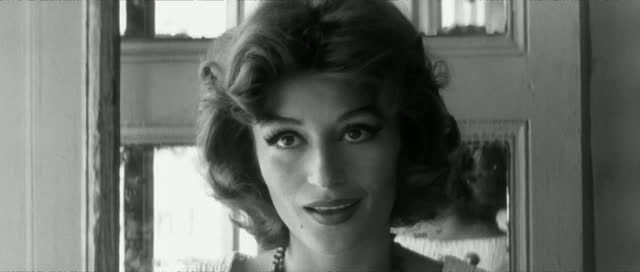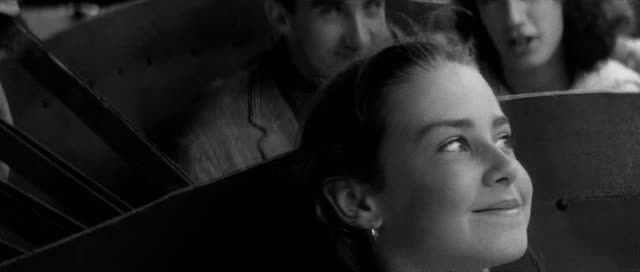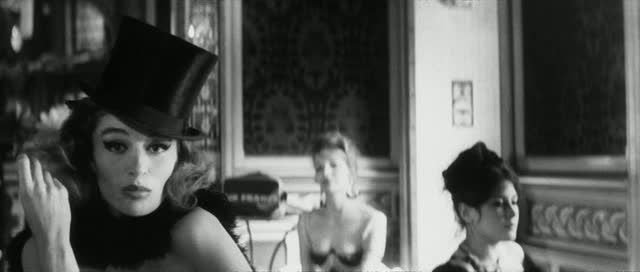
Jacques Demy's first film, the charming and fleet-footed Lola, opens with a dedication to the filmmaker Max Ophüls, and it's a very appropriate reference point. As with the other directors of the nascent French New Wave — with which Demy was tangentially associated, if not one of the core filmmaker-critics from Cahiers du cinema — Lola evinces a love of the movies in every frame. It's a film swooning and swirling with the desire to live in a movie, to have life fit together into the kinds of intricate puzzle-box plots that drive movie narratives. At any moment, a song might break out, a glamorous girl might stumble back into the life of the man who'd long loved her and never forgotten her, a young girl might fall in love and do something dramatic and romantic, a clueless and aimless young man might get tangled up in a smuggling ring and set off on an adventure, bound for exotic destinations. Ophüls' spirit is felt in the film in the graceful long takes and tracking shots (executed with panache by cinematographer Raoul Coutard) and in the chance collisions and subterranean connections between the characters in this sprawling cast, but the film is just as indebted to the slick, overtly fantastic cinema of Hollywood. Demy's Lola is a whirlwind tour of the director's fascination with Hollywood adventure pictures, musicals, gangster yarns and grand romances.
The Lola of the title (Anouk Aimée) is a dancer at a cabaret, nursing a seven-year aching for her first love, a sailor she'd met as a young girl, who returned to her a few years later, got her pregnant with a son, then disappeared again to make his fortune, promising to return someday. Though Lola doesn't realize it, the film that bears her name actually opens with this man, Michel (Jacques Harden), returning to town after a long absence, glimpsed driving into town in his flashy white convertible and a white suit to match, instantly recognizable as he weaves through the film, intersecting periodically with the characters but always dodging away from Lola before she can see him. This casual intersection of different stories drives the film, as the aimless young dreamer Roland (Marc Michel) by chance runs into the girl who'd been his best friend and his first love as a child, Cécile — who is in fact Lola, so completely inhabiting her sexy dancer persona that no one calls her by her real name anymore, they all call her Lola.
The film is structured around a complex series of unrequited loves and longings. Roland wants Lola, but she's insistent on waiting for the return of Michel, the only man she's ever loved — which doesn't stop her from passing the time with the American sailor Frankie (Alan Scott), who she says reminds her of her own lost sailor. Roland, meanwhile, becomes acquainted with the widow Mrs. Desnoyers (Elina Labourdette), an older woman raising a fourteen-year-old daughter who is, like Lola, named Cécile (Annie Duperoux). The relationships are complex: the widow obviously becomes attracted to Roland, while her daughter Cécile begins spending time with Frankie, developing a girlish infatuation with the older sailor. It is obvious that this younger Cécile is mirroring the life of her counterpart, Lola: like Lola, she spends a day at a fair with an older sailor on her fourteenth birthday, a joyous moment in time that, for Lola, later led to her own child and her current heartache.

Demy, who throughout the film emphasizes the import of one's first love, films the day at the fair for this younger Cécile with a magical, sensual quality that suggests that this memory will be marked in her mind for a long time to come, that it will take on a kind of lingering allure that will haunt her into adulthood. Cécile and Frankie ride on a merry-go-round together, the girl resting her head on his shoulder, smiling and looking up at him, her eyes shining with the girlish fire of her crush. When he gets off the ride, he jumps off in slow motion, seemingly drifting through the air, then picks her up and whirls her over his head, her hair spinning around her face in slow motion, the sun glistening behind her, her eyes filled with pleasure. It's as though this is already a memory, to be replayed over and over again in slow motion as this childish infatuation lingers into the future, leaving only the question: will Frankie someday return as Michel had for Lola, will Cécile's life mirror Lola's as a single mother raising a child that's the fruit of this kind of youthful passion?
These associations between the characters make Lola a rich and multi-layered movie, contrasting the implicit romanticism of its story — the girl who patiently waits seven years for the guy she loves to return — with the difficulties of being a woman dependent on the whims of men. Mrs. Desnoyers lost everything during World War II, her possessions, her home and, she adds as an afterthought, her husband, though the latter doesn't seem to have been a major loss since he was a no-good gambler anyway. As a result, she's raising her daughter alone, just as Lola is raising her son alone, and Roland himself embodies the result of such troubled family situations: he wasn't wanted as a child, growing up in a fractious and unhappy home torn apart by divorce, and it seems to have left a lasting impact on him. In this way, each character mirrors the others, providing visions of possible futures, with the same stories and the same situations repeating themselves with different characters playing the parts. If Lola's story has a happy ending — with Michel's white car finally taking her away in the end — there's no guarantee of similar happiness for Roland, who's walking the other way at the end of the film, heading off towards uncertain adventure, or for young Cécile, who runs away to pursue her sailor, or for Mrs. Desnoyers, chasing her daughter towards a man who may or may not bring her some happiness and stability at last.

The mirroring and repetitions extends into the cinematic reference points of the film. At one point, Roland goes to see the Gary Cooper movie Return to Paradise, which provides another layer of mirrors, with its plot about American military men romancing and impregnating foreign women, then leaving them to struggle on their own. Demy's incorporation of this film is a nod to his American cinematic influences, his love of Hollywood, but it also expresses some ambivalence about the American influence, some uncertainty about the American colonizing of Europe through the movies it exports abroad. More than that, though, Demy is in love with the movies, and in love with the ways in which movies can expand upon and glorify life, can make life bigger and bolder and grander.
When Roland, enamored with the Gary Cooper movie, decides he wants to travel, one woman in the bar where he hangs out says that everything always seems great in the movies, but another responds that life, too, is great. That's a central idea of this charming, whimsical film, in which these characters live their prosaic and troubled lives with the joie de vivre of a fun Hollywood movie, perhaps a musical. (There's a reason the most iconic scene is Lola's flirtatious performance of her own theme song, mugging and posing for the camera as she dances seductively.) These people are very familiar with Hollywood's glamor and its idealized image of life, but they're not always sure where the movies end and life begins. When Cécile tells her mother that she's been hanging out with the sailor Frankie, and that he's from Chicago, her mother responds, horrified, that there are no sailors in Chicago, only gangsters. She's taken the movies for reality, and associates Chicago with gangster pictures, with Jimmy Cagney or Scarface, so that the Hollywood image becomes the reality for those who can only experience a place through the movies. Similarly, Roland's haphazard involvement in a smuggling operation seems like a fantasy — he says it's like something out of a "fairy tale," but he might as well say it's like an American movie, a Bogart adventure picture set in exotic lands, with diamond smugglers and suspicious cops and boat rides and briefcase exchanges. To signal the movie origins of this plot, the soundtrack bursts into a dum-dum-dum-dum chugging suspense theme whenever Roland enters the area where his smuggling contact has his shop.
This is a wonderful and exciting film, bursting with a love of life and a love of movies, and especially a love of how the two intertwine. Whimsical and playful on the surface, Lola has some serious emotions at its core. Though Lola gets her Hollywood happy ending, it's not without a little twinge of regret over the other endings not taken, or without an acknowledgment of all the other characters, whose own stories are left hanging and unresolved.

7 comments:
I've written a piece about moviegoing in New York in the 1960's which will be coming out later this year in "Film Commnet" and Lola plays a pivotal role in that piece. It was a paritcular favorite of my crowd. We all used to see it every time it popped up at the repetory houses (The New Yorker, The Thalia, the Bleecker St. Cinema.)
Jacques had writeen it to be a full-press musical like The Umbrellas of CherbourgLola has often been described as the story of a woman's entire life told without flashbacks.
The most important movie echo is Les Dames du Bois de Boulogne. Elena Labourdette was the "petit danseuse" pimped out by her mother who Maria Casares uses in her plan to wreck vengeance on an ex-lover. When Ceicile tells Roland that her mother used to be a dancer she shows him a still of Labourdette in Bresson's film as proof.
More formally Lola is connected to as Roland returns in that film a successful diamond merchant. When he sings of his lost love "Autrefois j'ai aime une femme" Demy cuts to the arcade in Nates -- where Roland last saw Lola. The song is derived from the main theme of the earlier film.
Lola goes on in the emy canon, reappearing in America in his delicate little film Model Shop (1969)
David, that Film Comment piece sounds better and better every time you describe it.
This is a great film, no doubt about it, one I hadn't seen since college and loved revisiting recently. Its origins as a full-on musical remain in Lola's one musical number, but in many ways everything about the film shouts musical even though there's not much singing. It's a musical with almost no musical numbers.
Tout de Jacques
"Its origins as a full-on musical remain in Lola's one musical number, but in many ways everything about the film shouts musical even though there's not much singing. It's a musical with almost no musical numbers."
Interesting proposition there Ed, and I was thinking only UMBRELLAS and ROCHEFORT would safely quality for a musical countdown. Ha! I concur with David that the Bresson is recalled here, and appreciate this dazzling piece, summed up perfectly:
"This is a wonderful and exciting film, bursting with a love of life and a love of movies, and especially a love of how the two intertwine. Whimsical and playful on the surface, Lola has some serious emotions at its core."
Yep, it's a homage to Ophuls, and the style recalls LA RONDE for sure. Of course the central character is a partial essay on "Lola Lola" from Von Sternberg's THE BLUE ANGEL, but only the innocuous side. The film is another showcase for the ravishing camerawork of Coutard, and it's often rightly compared with the 'poetic neorealism' of 60's French cinema. It a rythmic and poetic piece and an ultimate expression of love for the movies.
I am also very much interested in David's upcoming FILM COMMENT piece, which goes to the heart of my own reflections of those wonderful years.
Thanks, Sam. You prompted me to revisit this one, as it's been a while, and I'll probably be returning to the other Demy classics in the coming months as well.
Between Bresson, Sternberg and Ophuls, this film has quite a lineage of cinematic reference points, which is appropriate since, as you say, it's a love letter to the movies.
I was looking for the arcade flashback from Umbrellas and couldn't find it. Here's the ending. It was inspired by the similarly happy/unhappy ending of Inge and kazan's Splendor in the Grass.
Guy and Madeline's litle boy is played by Michewl Legrand's son Herve (who is now a composer himself.)
By any barometer of measurement UMBRELLAS is one of the greatest musical films of all-time. That's an unforgettable ending! We want and we NEED this one on blu-ray!!!!
Post a Comment